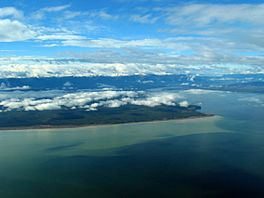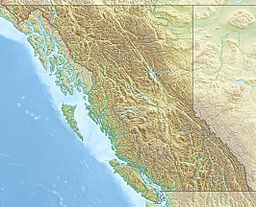Williston Lake facts for kids
Quick facts for kids Williston Lake |
|
|---|---|
 |
|
| Location | British Columbia |
| Coordinates | 56°N 124°W / 56°N 124°W |
| Type | Reservoir |
| Primary inflows | Peace River |
| Primary outflows | Peace River |
| Basin countries | Canada |
| Max. length | 251 km (156 mi) |
| Max. width | 155 km (96 mi) |
| Surface area | 1,761 km2 (680 sq mi) |
| Average depth | 42 m (138 ft) |
| Water volume | 74,000,000,000,000 litres (60,000,000 acre⋅ft) |
| Surface elevation | 671 m (2,201 ft) (level varies by 18 m) |
Williston Lake is a huge man-made lake, also known as a reservoir, located in the northern part of British Columbia, Canada. It was created by building a large wall, called the W. A. C. Bennett Dam, across the Peace River. This dam holds back the water, forming the lake.
Williston Lake is very important because it is the largest lake in British Columbia by area. It is also one of the biggest reservoirs in the world when you consider how much water it holds!
Contents
Where is Williston Lake Located?
Williston Lake sits in a natural dip in the land, which used to be the upper part of the Peace River. This area is part of the Rocky Mountain Trench, a long valley between mountain ranges. Before the lake was formed, two rivers, the Parsnip and the Finlay, met at a place called Finlay Forks to create the Peace River. Now, this meeting point is covered by the lake.
The lake has three main arms, or "reaches," which are like long sections of water. These are the Peace Reach, the Parsnip Reach, and the Finlay Reach. Together, these reaches cover a total area of about 1,761 km2 (680 sq mi).
Rivers that Feed the Lake
Many rivers and creeks flow into Williston Lake, bringing water from the surrounding land. These are called tributaries. Some of the main rivers that feed the lake include:
- Finlay River
- Omineca River
- Ingenika River
- Ospika River
- Parsnip River
- Manson River
- Nation River
- Nabesche River
Smaller streams like Clearwater Creek and Carbon Creek also add water to the reservoir.
Parks Around the Lake
Several provincial parks are found along the shores of Williston Lake. These parks help protect the natural beauty and wildlife of the area. Some of these parks are:
- Muscovite Lakes Provincial Park
- Butler Ridge Provincial Park
- Heather-Dina Lakes Provincial Park
- Ed Bird-Estella Provincial Park
These parks offer places for people to enjoy nature, explore, and sometimes camp.
How Williston Lake Was Created
Williston Lake was formed in 1968. This happened when the W. A. C. Bennett Dam was finished on the Peace River. When the dam was built, the water behind it started to rise, flooding a large area of land. This land was the traditional home of the Tsay Keh Dene First Nation, an Indigenous group in Canada. The creation of the lake changed their way of life significantly.
The reservoir was named after a person named Ray Gillis Williston. At the time, he was a government minister in charge of lands, forests, and water.
Images for kids
See also
 In Spanish: Lago Williston para niños
In Spanish: Lago Williston para niños


